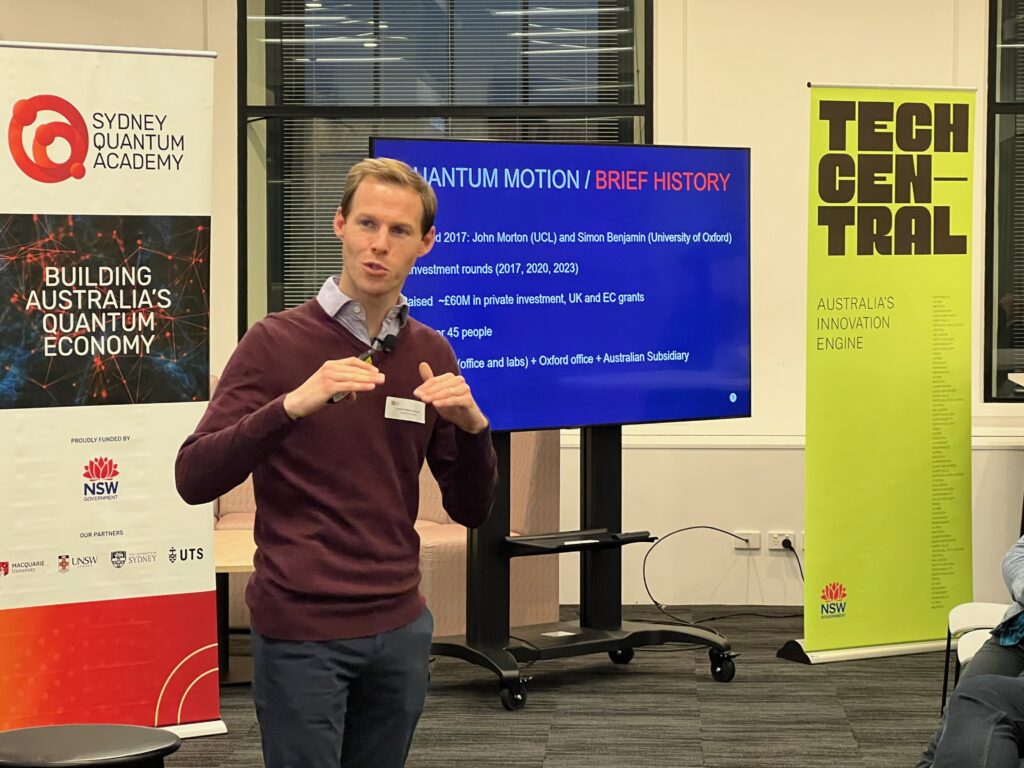From Lab to Entrepreneur: Journey of a Physicist
“If you can do a PhD in quantum physics, you can work out business,” said Dr James Palles-Dimmock, CEO of Quantum Motion. “It’s not as complicated as you fear. And you don’t need an MBA.”


“If you can do a PhD in quantum physics, you can work out business,” said Dr James Palles-Dimmock, CEO of Quantum Motion. “It’s not as complicated as you fear. And you don’t need an MBA.”
Palles-Dimmock was speaking at a Sydney Quantum Academy’s Quantum Innovators Network event on 21 June 2023, chaired by Petra Andren, Head of Innovation Districts at the Greater Cities Commission, and held as part of the City of Sydney’s Visiting Entrepreneur Program. It attracted 65 academics, entrepreneurs, and government representatives.
The UK-based Quantum Motion – working to build fault-tolerant quantum computing hardware – has raised over £60 million (US$77 million) from international investors and grown from scratch to a team of more than 40 since its founding in 2017.
Asked by a young researcher what it was that drives success in the fast-changing quantum field, Palles-Dimmock nominated the most important: talent. Because the quantum industry in still in its infancy, he said, technological advances are essential to drive it forward and create scale – so new ideas and new approaches are key.
“In short – you can’t do innovation without talent. Brains are the engines of innovation,” he said. It’s a key reason Quantum Motion wants to strengthen ties with Australia, and with Sydney’s burgeoning quantum ecosystem in particular. “The quality of research and talent over here is undeniable. Already over 60% of our quantum hardware team hail from Sydney.”

To create a robust quantum industry, and to fully realise the economic benefits of quantum computing, major advances are needed in the design and construction of qubits, or ‘quantum bits’, the basic units of information processing in quantum computing.
“For quantum computing to be useful, we’ll need millions of qubits. But we can barely manage to create a few hundred,” Palles-Dimmock said. “From where we are today, we cannot jury-rig a solution from small numbers of qubits to massively large.”
He argued that developing truly scalable quantum computers will only be possible by harnessing the silicon CMOS chip technology that made today’s smartphones and computers possible. “To make good quality qubits in large quantities, they need to be cheap. And with silicon CMOS process, we know how to do that.”
CMOS (or complementary metal-oxide-semiconductor, pronounced ‘see-moss’) is the fabrication process at the heart of modern computers. It is used for making all sorts of integrated circuit components — including microprocessors, microcontrollers, memory chips and other digital logic circuits, as well as analogue circuits such as image sensors and data converters.
The Quantum Innovators Network is a Sydney Quantum Academy community event designed to empower entrepreneurially-minded quantum innovators. To stay informed and hear about our future events, seminars, job opportunities and more, join our mailing list.